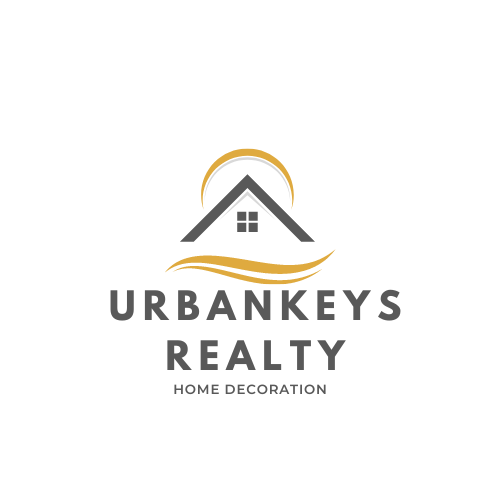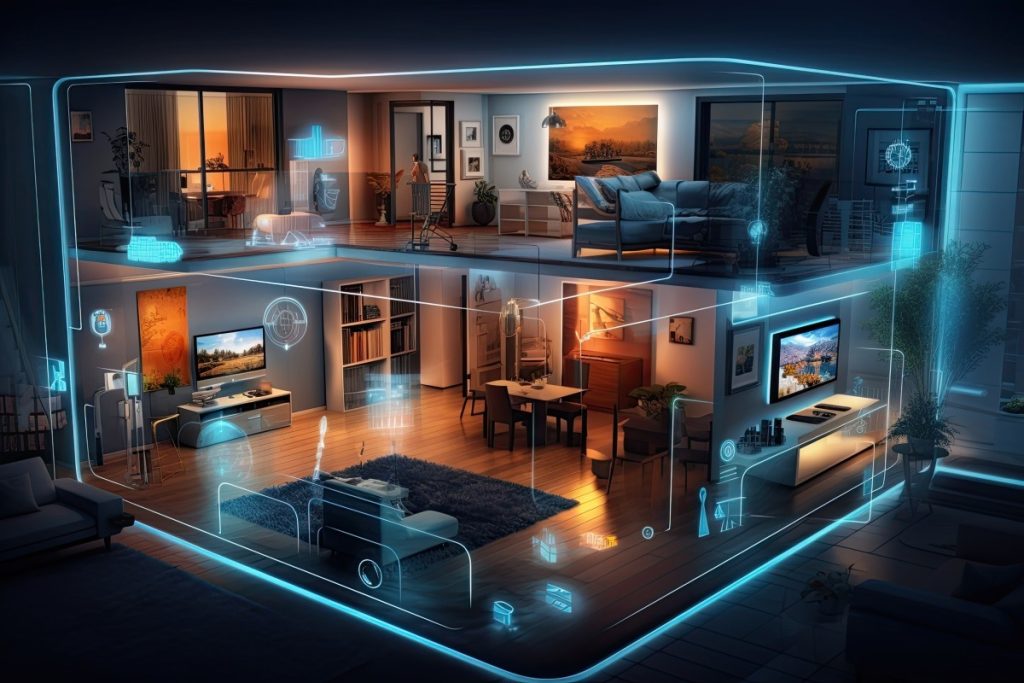blog
The Future of Smart Homes in Luxury Real Estate
As technology continues to advance, smart homes are rapidly becoming the new standard in luxury real estate. Home automation, artificial intelligence, and the Internet of Things (IoT) are transforming how we live, work, and interact with our surroundings. Luxury homes are now embracing cutting-edge technology to offer unmatched convenience, security, and energy efficiency. From intelligent lighting systems to fully integrated home control platforms, the future of smart homes in luxury real estate is brighter, more sophisticated, and more seamless than ever before.
In this article, we will explore how smart homes are revolutionizing luxury real estate and what the future holds for this growing trend.
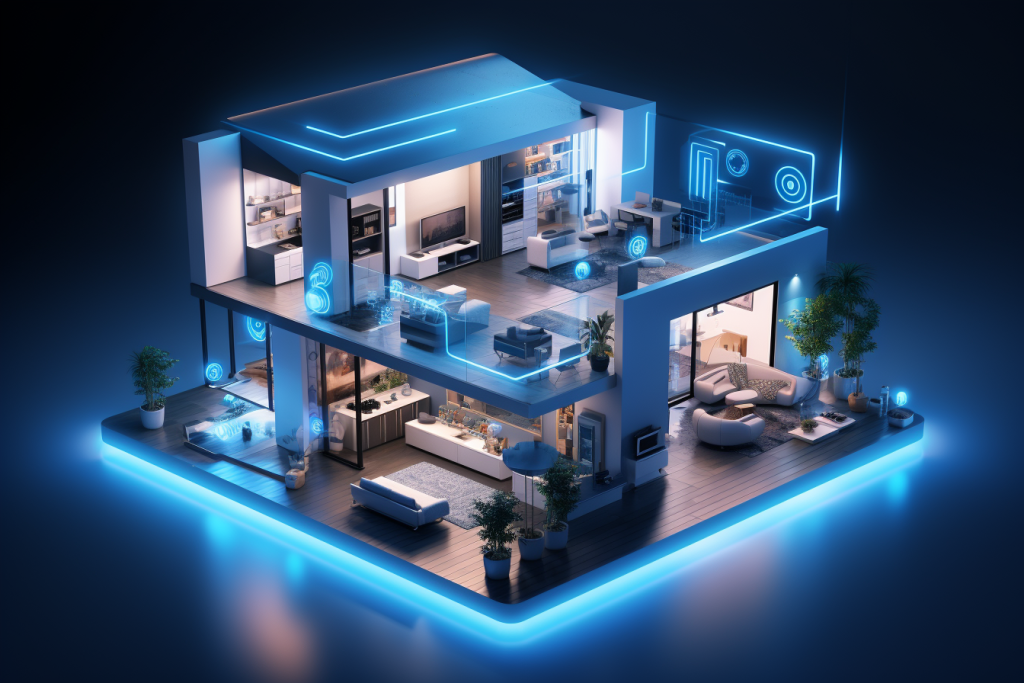
1. What Are Smart Homes?
A smart home is a residence equipped with advanced technology that allows homeowners to control various systems and devices remotely via smartphones, tablets, or voice commands. These homes are integrated with Internet of Things (IoT) devices, which allow for automation and the ability to control everything from lighting and heating to security systems and entertainment systems.
In luxury real estate, smart home technology is not just about convenience; it’s about enhancing the overall experience, optimizing energy use, and offering homeowners a level of control and comfort that was previously unimaginable.
2. Seamless Integration and Control
The future of smart homes in luxury real estate will focus on seamless integration and centralized control. In the past, smart devices often operated in silos, requiring multiple apps or interfaces to manage different systems. However, the next wave of smart homes will provide fully integrated systems that work together harmoniously.
Homeowners will be able to control lighting, heating, security, entertainment, and even kitchen appliances from a single, intuitive platform. Voice-activated assistants like Amazon Alexa, Google Assistant, or Apple’s Siri will become central hubs for home management, enabling homeowners to perform tasks hands-free, from adjusting the thermostat to ordering groceries or controlling home entertainment systems.
As technology evolves, the future may bring even more seamless and intuitive systems that anticipate the homeowner’s needs, learning their preferences over time to create a more personalized living experience.
3. Energy Efficiency and Sustainability
Luxury homeowners are becoming increasingly conscious of the environment and the need for sustainable living. Smart homes are well-positioned to meet these demands, offering advanced energy management systems that optimize energy use, reduce waste, and lower utility costs.
Smart thermostats, for example, automatically adjust heating and cooling based on the homeowner’s daily habits, ensuring that energy is only used when necessary. Smart lighting systems can also adjust based on time of day or occupancy, ensuring lights are turned off when rooms are not in use.
In the future, we can expect even more advanced technologies that help luxury homes go green. Solar panels integrated with smart grids, energy-efficient appliances, and even home systems that can monitor and manage water usage could become standard in luxury homes. These technologies not only contribute to a sustainable future but also reduce the overall environmental impact of large, energy-consuming properties.
4. Enhanced Security and Surveillance
Security is one of the top priorities for luxury homeowners, and smart home technology is revolutionizing how security systems function. In addition to traditional alarms, modern smart homes offer highly advanced surveillance features such as facial recognition, motion detectors, and remote monitoring capabilities.
Smart locks and keyless entry systems ensure that homeowners can remotely control access to their properties, allowing them to unlock doors or gates for guests or service providers from anywhere in the world. Cameras, sensors, and security systems can be monitored through smartphones or computers, providing real-time alerts and live video feeds.
In the future, smart security systems may incorporate advanced AI to detect unusual behaviors or threats and send alerts before a break-in occurs. Biometric authentication could further enhance security, allowing for fingerprint or retina scans to verify identity for entry.
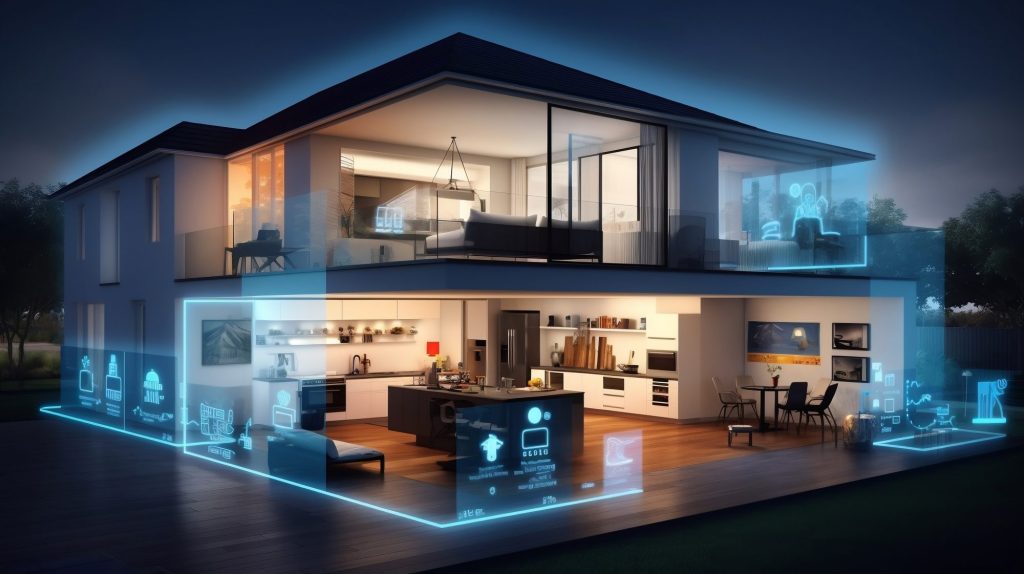
5. Home Automation for Comfort and Convenience
In luxury homes, automation is all about providing a highly personalized experience, where everything is designed to make daily life more comfortable and convenient. Imagine walking into your home after a long day, and as you enter, the lights automatically adjust to your preferred brightness, the temperature is set to your ideal comfort level, and your favorite music starts playing.
Smart homes offer this level of convenience through pre-programmed routines, which can be triggered by time of day, occupancy, or even the homeowner’s location. These routines can include tasks such as adjusting the thermostat, activating the home’s security system, or even starting the coffee machine.
Smart kitchens are another major area of innovation. With the integration of IoT devices, luxury homes are introducing smart appliances that can help with cooking, shopping, and cleaning. Smart refrigerators can monitor food inventory, while smart ovens can be pre-heated remotely or programmed with cooking instructions based on the recipe selected.
As these systems become more advanced, they will continue to provide an unparalleled level of comfort, allowing homeowners to spend less time managing their home and more time enjoying it.
6. Smart Home Entertainment Systems
Entertainment is a key element of luxury living, and smart homes are enhancing the experience with state-of-the-art, integrated media systems. Whether it’s a home theater system, a multi-room audio setup, or a cutting-edge virtual reality system, smart technology is bringing a new level of immersion and convenience to home entertainment.
Luxury homes today often feature home automation systems that allow residents to control their entertainment systems across multiple rooms with a single interface. Homeowners can select movies, adjust sound settings, or even control ambient lighting, all from one device or voice command.
Looking ahead, smart homes will continue to offer next-level entertainment, such as holographic displays, ultra-high-definition televisions, and fully immersive home theater experiences with surround sound systems that can be adjusted to create the perfect movie-watching environment.
7. Smart Health and Wellness Features
As wellness and self-care become increasingly important to luxury homeowners, smart homes are incorporating features that prioritize health, fitness, and overall well-being. In the future, we can expect homes equipped with systems that monitor air quality, water purity, and even sleep patterns.
Smart home technologies like air purifiers, humidity control systems, and circadian lighting are being integrated to help create a healthier, more comfortable living environment. Smart mirrors in bathrooms may offer personalized wellness routines, including skin analysis, fitness tracking, or meditation guidance.
Homeowners may also be able to track their fitness goals through integrated health systems that connect to wearable devices or fitness equipment. These systems will offer data on everything from daily activity levels to stress management, allowing homeowners to optimize their health and fitness routines in the comfort of their own home.
8. The Role of Artificial Intelligence (AI) in Smart Homes
Artificial intelligence (AI) is set to play a significant role in the future of smart homes, making them more intuitive and responsive than ever before. AI can help automate routine tasks, predict the homeowner’s preferences, and even assist with decision-making.
For instance, AI-powered systems can learn your daily habits — such as when you wake up, leave for work, or return home — and adjust the home’s settings accordingly. These systems may also monitor your home’s energy usage, recommending ways to save costs while maintaining comfort. In terms of security, AI will continue to improve the detection of potential threats by analyzing patterns and behaviors.
As AI continues to evolve, luxury homes will become increasingly self-sufficient, anticipating homeowners’ needs before they even have to ask.
9. The Future of Smart Homes: Fully Integrated Smart Cities
The future of smart homes in luxury real estate will not just be about individual homes, but also about creating fully integrated smart cities. In the near future, entire urban areas may be connected through IoT technology, creating a cohesive network of smart homes, businesses, and public spaces.
Smart cities will be designed to optimize resources, improve traffic flow, enhance safety, and create more sustainable living environments. Luxury homes will be part of these cities, with seamless integration into the broader ecosystem. Homeowners will be able to control everything from traffic lights to municipal services through their smart home systems.
These smart cities will redefine the urban living experience, offering unparalleled convenience, security, and sustainability, with luxury homes at the center of this technological revolution.
Conclusion
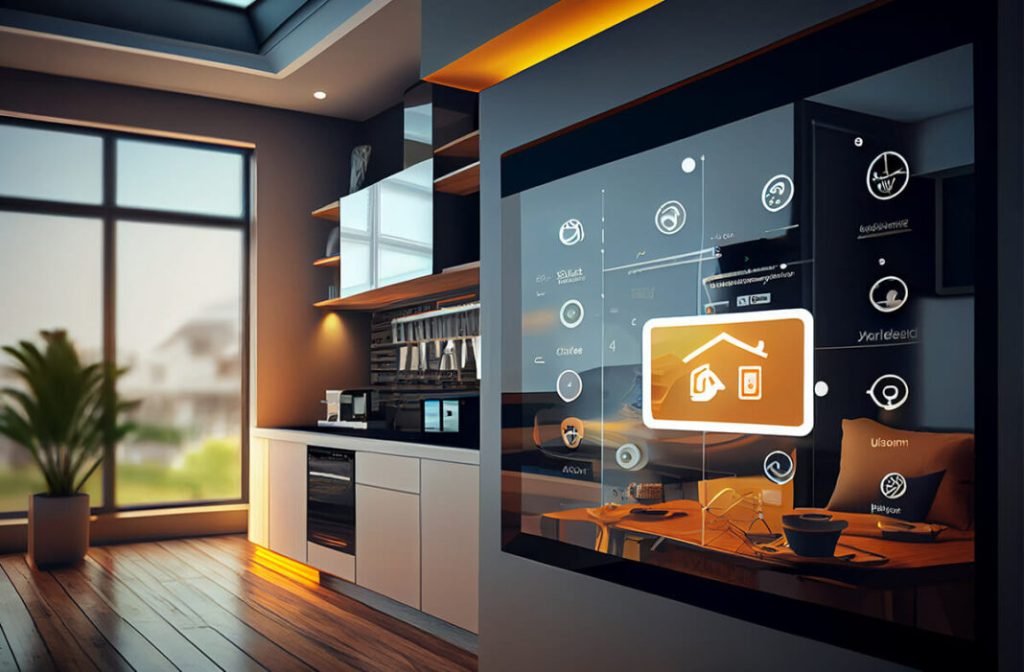
The future of smart homes in luxury real estate is incredibly exciting. As technology continues to advance, the potential for smarter, more efficient, and more luxurious living environments grows exponentially. From enhanced convenience and security to improved sustainability and wellness features, smart homes are redefining what luxury living means.
As we look toward the future, the integration of artificial intelligence, advanced home automation, and eco-friendly technologies will continue to shape the luxury real estate landscape. With each new innovation, smart homes will provide homeowners with an experience that’s not only luxurious but also intuitive, sustainable, and designed to enhance every aspect of their lives.
